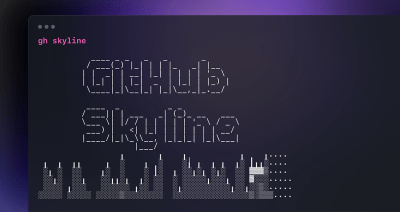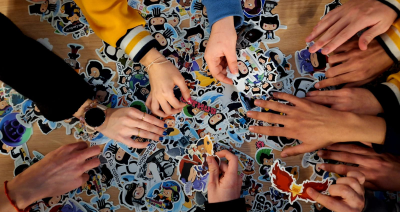How to launch a tech career in 2021
How GitHub Education and Major League Hacking have teamed up to bridge the gap between school and work.
Making the leap from school to work is not a seamless process. Interviews that don’t line up with your skills, location dependent job postings, and a lack of experience in real-world tools and projects are all challenges that have been around since before this year. Even before COVID-19, 90% of hiring managers reported it was difficult to find and hire the right tech talent. The pandemic has only widened the growing gap.
That’s why we’re on a mission to bridge the gap between school and work–to bring together developers, educators, and employers with the resources and solutions to ensure a successful talent pipeline.
Bridging the gap between school and work
How can students navigate this uncharted water? Mike Swift, CEO and Co-Founder of Major League Hacking (MLH) tackled some of those challenges on the Univers(ity) track of GitHub Universe 2020. He broke down barriers developers and employers face, and provided insights into how to rethink the way we train the next generation of technologists.
As Swift noted, with technology changing so quickly, it becomes a challenge for developers and educators to keep up. He suggested that a first step is to focus on areas that don’t change as fast, such as fundamentals and theory. However, as Swift explained, that doesn’t fully solve the challenge of bridging what is taught in schools and how it applies to actual work. Employers want to see you can solve real-world problems with code, and that requires integrating real-world experience into the curriculum.
What can you do outside of the classroom? Virtual hackathons are becoming increasingly more popular among developers and employers during the pandemic. Hackathons help provide a hands-on experiential opportunity for developers to apply classroom learning and create solutions to real problems. These marathon-like sprints provide developers with a space to work on personal projects, showcase their work, and learn skills outside of the classroom. In 2019, MLH helped facilitate more than 200 hackathons worldwide with nearly 70,000 participants. Nearly 90% of participants reported learning skills at hackathons that they could not get in a classroom.
Hackathons aren’t just for developers. They also help bridge the gap between school and work by providing a window for employers to see how developers solve problems. This allows potential employers to more closely filter ideal candidates.
While hackathons inch us closer to bridging the gap, they aren’t without their challenges. As Swift mentioned, because hackathons are a sprint, shortcuts are often taken and the result may not be a good indication of quality work.
As an alternative, Swift shared why open source is another great place to turn if you’re looking to boost your portfolio. Open source contributions provide the type of production quality code samples companies are looking for. However, as he pointed out, 73% of hackers want to contribute to open source, but don’t know how.
That’s where Major League Hacking (MLH) comes in
Major League Hacking (MLH) is a mission driven community-first organization. You’ll find MLH wherever there is an opportunity for developers to gain the technologies they’ll need in their career. MLH has teamed up with Facebook, Royal Bank of Canada, DEV, Ovio, PlutoVR, Interhacktive, Amazon Web Services, Indeed, Twilio, NYC Tech Talent Pipeline, and Techtonica. Together the coalition of companies offers a new kind of industry experience: the MLH Fellowship, powered by GitHub.
MLH is designed to overcome common challenges such as difficulty in scaling and provide the applied experience that both developers and employers are depending on. The program is “remote first, low lift, affordable, easy to drop-in, and built for scale.” More than 30,000 developers applied for the first 300 spots in the program. Of those alumni, nearly 70% made their first major open source contributions during the MLH program.
“The Fellowship was my first time writing code in Julia, as well as my first time making significant contributions to open source software. I’m confident that the technical and people skills and the culture of building things I picked up here would help me throughout my career.” – Jivitesh Jain
The job market is rapidly-changing, as is technology. The MLH Fellowship provides a new way to reach talented students by matching developers with real-world projects. Over the course of 12 weeks, Fellows will collaborate with other aspiring software engineers to work on problems that companies are looking to solve. This helps to train and empower developers by providing professional experience beyond the classroom at top companies. It doesn’t stop there. Fellows have access to mentors, participate in events, and navigate a fully integrated skill based curriculum. The Fellows represent 23 regions and 15 timezones, allowing them to engage with other developers from around the world. Programming languages include JavaScript, Python, and C/C++.
MLH understands the obstacles and offers aspiring engineers the opportunity to utilize the best parts of hackathons, opensource, and internships; join an amazing community of developers; build skills outside of the classroom; and finally, launch a successful career in tech. It’s a win-win as MLH provides employers with talented developers and Fellows with a strong portfolio piece, community of builders, and a path to landing their first job.
Together we are not only closing the skills gap, but rethinking how we train the next generation of technologists to ensure a successful talent pipeline. Interested in learning more? Watch Mike Swift at GitHub Univers(ity).
Written by
Related posts

Supporting the next generation of developers
Here’s your opportunity to empower the teen in your life to get a start in open source development.

How we built the GitHub Skyline CLI extension using GitHub
GitHub uses GitHub to build GitHub, and our CLI extensions are no exception. Read on to find out how we built the GitHub Skyline CLI extension using GitHub!
